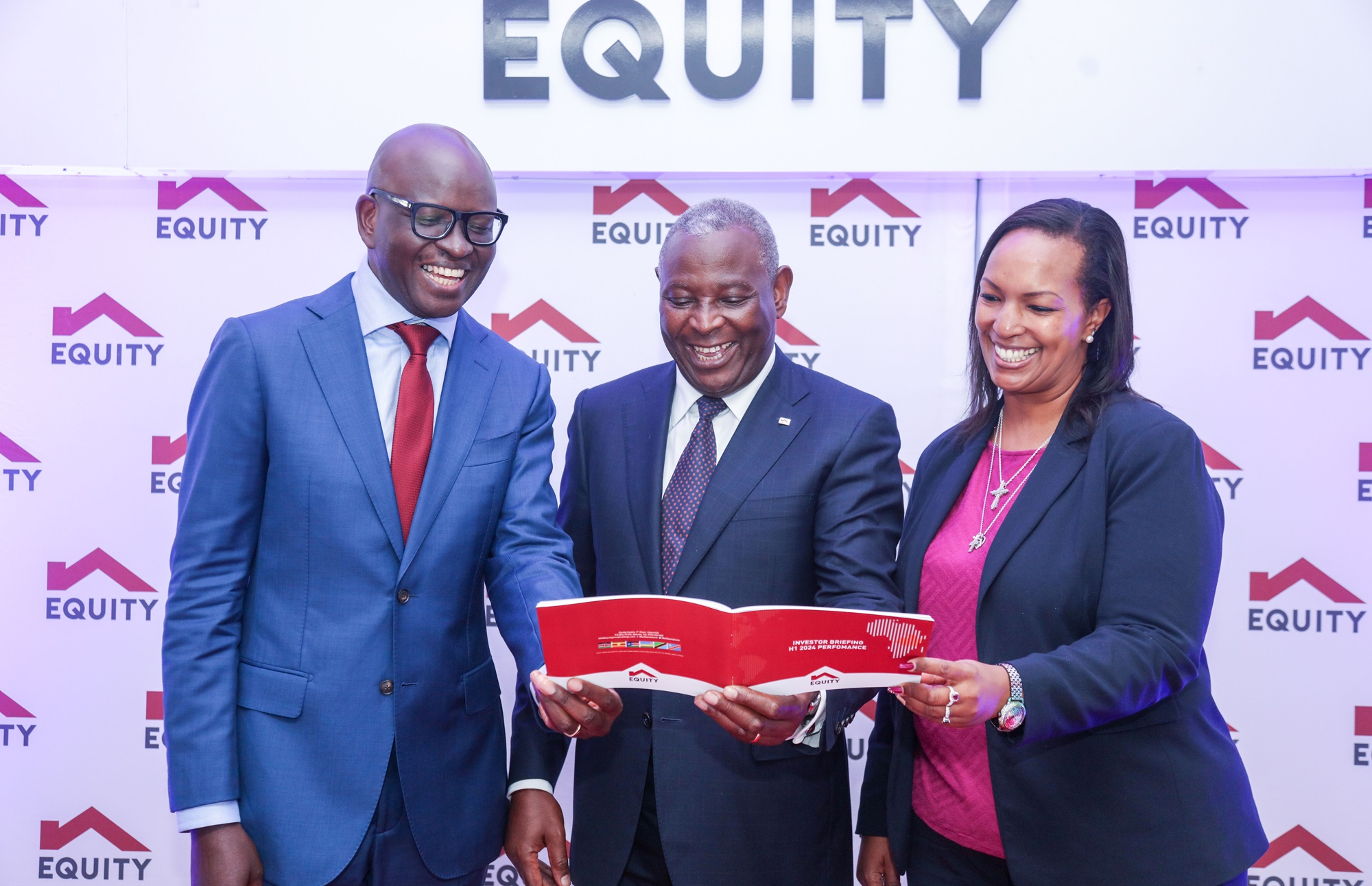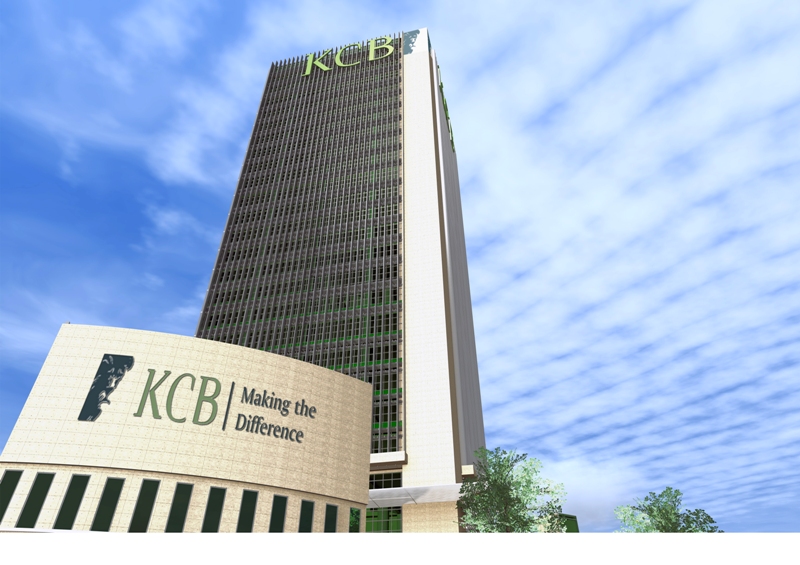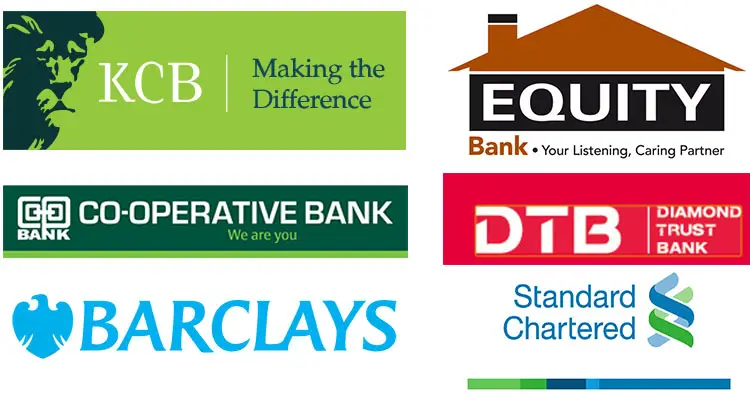Business & Money
Equity Group Holdings Soars with a Record Half-Year Profit of KSh 29.6 Billion
In a major financial milestone, Equity Group Holdings announced a net profit of Sh29.6 billion for the half-year ending June 2024, reflecting a strong 32% growth from the Sh 22.4 billion reported during the same period in 2023. This significant rise highlights the bank’s solid financial performance and effective strategic execution

: Equity Group Holdings’ record-setting performance highlights its resilience and strategic foresight. With a focus on digital transformation, cost efficiency, and regional expansion, the bank is set for sustained growth and leadership in East Africa’s banking sector, continuing to drive inclusive financial services and deliver value to stakeholders.
By Charles Wachira
In a significant financial stride, Equity Group Holdings August 12 reported a substantial net profit of Sh29.6 billion for the half-year ending June 2024, marking a notable 32% increase compared to the Sh22.4 billion net profit recorded in the same period last year. This impressive leap underscores the bank’s robust financial health and strategic execution.
Key Highlights:
- Loan Book Growth: Equity Group’s loan portfolio expanded by 18%, reaching Sh800 billion, up from Sh678 billion in the previous year. This growth reflects increased lending to small and medium-sized enterprises (SMEs), a core segment of its business.
- Digital Banking Expansion: The bank’s digital banking platform saw a 25% increase in transaction volumes, with over 95% of all customer transactions conducted digitally. This shift has improved customer convenience and reduced operational costs significantly.
- Cost Management: Despite economic challenges, Equity Group maintained a tight rein on expenses, achieving a cost-to-income ratio of 45%, down from 48% last year. This efficiency reflects ongoing efforts to streamline operations.
- Regional Expansion: Equity Group has been expanding its regional footprint, particularly in the Democratic Republic of Congo (DRC), where it has experienced rapid growth.
- Financial Inclusion: The bank’s commitment to enhancing financial inclusion across East Africa has been pivotal in its accelerated profitability.
Financial Metrics:
● Assets: Equity Group’s total assets have grown, underpinned by the expansion of its loan portfolio and digital banking infrastructure.
● Deposits: Details on deposit growth were not specified, but typically, growth in deposits supports lending capacity and overall balance sheet strength.
● Non-Performing Loans (NPLs): Specific figures on NPLs were not provided, but effective management of NPLs is crucial for maintaining asset quality and profitability.
● Interest Income Growth: The group’s interest income growth reflects the expansion of its loan book and potentially higher yields on its assets.
Regional Contribution:
Equity Group’s footprint spans several East African countries, with notable operations in Kenya, Uganda, Tanzania, Rwanda, South Sudan, and the Democratic Republic of Congo (DRC). While specific contributions from each country were not detailed, the DRC has been highlighted for its rapid growth, indicating substantial contributions to the group’s overall performance. Other countries likely contribute differently based on market dynamics, regulatory environments, and economic conditions.
Conclusion:
Equity Group Holdings’ record-setting performance underscores its resilience and strategic vision in navigating market complexities. With a focus on digital transformation, cost efficiency, and regional expansion, the bank is well-positioned for sustained growth and continued leadership in the regional banking sector. As it progresses into the second half of the year, Equity Group remains committed to driving inclusive financial services and delivering value to stakeholders.
This comprehensive overview highlights Equity Group Holdings’ pivotal role in shaping the financial landscape of East Africa, which is driven by innovation, efficiency, and a steadfast commitment to its mission.
Keywords–Equity Group Half-Year 2024 Profit Growth:Equity Bank Loan Book Expansion 2024:Digital Banking Growth in East Africa 2024:Equity Group Regional Expansion in DRC:Financial Inclusion in East Africa by Equity Bank
Business & Money
KCB Group Surpasses Equity with US$ 342.31 Million Nine-Month Profit

: KCB Group reports Sh44.5B ( US$ 342.31) nine-month profit, outpacing
Equity Bank. Learn about its 49% growth, challenges, and stock performance this
year.
KCB Group Plc has outperformed Equity Bank to cement its position as Kenya’s leading
lender, posting a net profit of Sh44.5 billion for the nine months ending September
This represents a 49% year-on-year growth, surpassing Equity Bank’s Sh37.5
billion profit during the same period.
Profit Growth Driven by Core Business Performance
The remarkable profit growth was fueled by higher earnings from both interest and non-
interest income streams. KCB’s diverse revenue base has been pivotal in maintaining
its dominance in the competitive banking sector.
Non-Performing Loans a Key Concern
Despite the impressive profit growth, KCB’s non-performing loan (NPL) ratio rose to
18.5%, compared to 16.5% last year. This increase highlights persistent challenges in
managing credit risk, with Chief Financial Officer Lawrence Kimathi acknowledging it as
a “pain point” for the bank.
KCB Stock Outshines Peers on NSE
KCB’s strong financial performance has translated into exceptional stock market results.
The bank’s stock has risen 78.8% year-to-date, making it the best-performing banking
stock on the Nairobi Securities Exchange (NSE).
Plans to Sell National Bank of Kenya
Earlier this year, KCB announced plans to sell its struggling subsidiary, National Bank of
Kenya (NBK), to Nigeria’s Access Bank. While Nigerian regulators have approved the
deal, it is still awaiting clearance from Kenya’s Central Bank. The sale aims to
streamline KCB’s operations and address losses at NBK.
CEO Paul Russo Optimistic About Year-End Performance
“The journey has not been without its hurdles, but our ability to walk alongside our
customers has driven our success,” said KCB CEO Paul Russo. He expressed
confidence in closing the year on a high note, leveraging improving economic conditions
across the region.
Key Figures at a Glance
● Net Profit: Sh44.5 billion (+49%)
● Non-Performing Loan Ratio: 18.5% (up from 16.5%)
● Stock Performance: +78.8% year-to-date
KCB’s strong performance underscores its resilience in navigating challenges and its
commitment to sustaining growth in Kenya’s banking sector.
Business & Money
Top 10 Kenyan banks by total assets as of 2023, based on data from the Central Bank of Kenya:

KCB Bank Kenya Limited
Total Assets: KSh 1.425 trillion
Market Share: 17.4%
Equity Bank Kenya Limited
Total Assets: KSh 1.004 trillion
Market Share: 12.2%
NCBA Bank Kenya PLC
Total Assets: KSh 661.7 billion
Market Share: 9.2%
Co-operative Bank of Kenya
Total Assets: KSh 624.3 billion
Market Share: 8.8%
Absa Bank Kenya PLC
Total Assets: KSh 520.3 billion
Market Share: 6.6%
Standard Chartered Bank Kenya
Total Assets: KSh 429.3 billion
Market Share: 5.9%
Stanbic Bank Kenya
Total Assets: KSh 449.6 billion
Market Share: 5.8%
I&M Bank Limited
Total Assets: KSh 405.6 billion
Market Share: 5.4%
Diamond Trust Bank Kenya
Total Assets: KSh 399.6 billion
Market Share: 5.3%
Bank of Baroda (Kenya) Limited
Total Assets: KSh 201.9 billion
Market Share: 2.8%
These rankings illustrate the dominance of large Tier 1 banks, which collectively control over
76% of the market share. Strategic expansions, increased deposit mobilisation, and robust
lending practices underpin the sector’s strong performance
Business & Money
Vasundhara Oswal’s Legal Struggles and Family’s Plea for Justice

: Vasundhara Oswal, daughter of industrialist Pankaj Oswal, faces serious
charges in Uganda. The Oswals call for UN intervention amid claims of corporate
jealousy.
Vasundhara Oswal, the 26-year-old daughter of prominent Swiss-Indian industrialist
Pankaj Oswal, has found herself at the centre of a legal storm in Uganda.
Her father, a well-established business figure, is known for his diverse investments,
most notably a $150 million ethanol plant in Uganda.
This plant, the largest of its kind in East Africa, is a key part of Oswal’s broader strategy
to invest in industrial and eco-friendly solutions in the region. The facility produces extra-neutral alcohol (ENA), which is used in the beverage, cosmetics, and pharmaceutical industries.
It is recognised for its modern technology and sustainable practices, such as zero liquid
discharge, emphasising the Oswal family’s commitment to both industrial growth and
environmental responsibility.
In addition to the ethanol plant, Pankaj Oswal has made strategic investments across
various industries, including petrochemicals, agriculture, and real estate.
His ventures reflect a global reach, extending to Australia and India, where he has
been involved in industries ranging from agriculture to renewable energy.
His diversified business approach and commitment to sustainability have made him a prominent figure in international business. However, in October 2024, the family’s legacy was overshadowed by the legal troubles surrounding Vasundhara Oswal.
She was detained on October 1, 2024, after being accused of involvement in the
alleged murder of Mukesh Menaria, a former employee who had worked with the
Oswals since 2017.
Menaria had accused the family of harassment but later testified under oath that they
had not harmed him Despite this, charges of kidnapping and murder were brought against Vasundhara.
Her family has strongly denied these allegations, claiming that the charges are
politically motivated and part of a larger conspiracy orchestrated by their business rivals
in collaboration with corrupt officials in Uganda.
The Oswals have appealed to the United Nations, seeking intervention and asserting
that the legal proceedings against Vasundhara are unlawful. Vasundhara has actively managed the family business throughout her career, especially the ethanol plant, and led the company’s sustainable initiatives.
Beyond her business involvement, she has also been an advocate for community
welfare and mental health, further cementing the Oswal family’s reputation for corporate
social responsibility.
The unfolding legal drama has raised important questions about the intersection of
business, politics, and the legal systems in Uganda.
While the Oswal family’s ventures reflect a blend of industrial innovation and social
responsibility, the legal challenges Vasundhara faces have cast a shadow over their
business empire, highlighting the complex dynamics at play in East Africa.
-

 Business & Money8 months ago
Business & Money8 months agoEquity Group Announces Kshs 15.1 Billion Dividend Amid Strong Performance
-

 Politics3 months ago
Politics3 months agoFred Okengo Matiang’i vs. President William Ruto: A 2027 Election Showdown
-

 Politics2 months ago
Politics2 months agoIchung’wah Faces Mt. Kenya Backlash Over Gachagua Impeachment Support
-

 Politics5 months ago
Politics5 months agoPresident Ruto’s Bold Cabinet Dismissal Sparks Hope for Change
-

 Politics5 months ago
Politics5 months agoKenya Grapples with Investor Confidence Crisis Amid Tax Protest Fallout
-

 Politics5 months ago
Politics5 months agoPresident Ruto’s Lavish Spending Amid Kenya’s Economic Struggles Sparks Outrage
-

 Politics4 months ago
Politics4 months agoJohn Mbadi Takes Over Kenya’s Treasury: Challenges Ahead
-

 Business & Money2 weeks ago
Business & Money2 weeks agoMeet Kariuki Ngari: Standard Chartered Bank’s new CEO of Africa. What’s Next?





